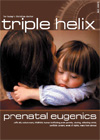Speaking to the Daily Telegraph recently, Lisa Green from Margate, Kent, described how 35 weeks into her second pregnancy, her obstetrician broke the news that her baby had Down's syndrome, and encouraged Mrs Green and her husband to consider a termination. She went on to say,'My baby was fully formed and his name was decided. I was appalled. He urged us to think about the termination and think about how having a baby with “mental retardation”would affect our lives.'
Mr and Mrs Green decided to go ahead with the pregnancy and, two weeks later, she gave birth to Harrison who is now two years old and has just started nursery part-time. He is, according to his mother, a 'happy and healthy' child. However, Mrs Green added, 'The frightening thing is that, had we been told by the same doctor about the Down's syndrome earlier in the pregnancy, there is a chance we might have decided to abort. That decision would have been based on incomplete and biased information.'Their obstetrician, Mr Prakash Belgaumkar, reportedly 'listed only the potential negatives about Down's syndrome', and failed to provide the couple with any further information to read 'for a more balanced view'.[1]
The NHS National Down's Syndrome Cytogenic Register (NDSCR) shows that in 2004 abortions of Down's Syndrome children, at about 937, outstripped live births at 657. The register contains detailed data on all cases of Down's syndrome diagnosed cytogenetically in England and Wales from 1989 to 2004.[2] Similar figures published by the Down's Syndrome Association, demonstrate that 62% of Down's Syndrome children are diagnosed in the womb, and 92% of these are aborted.[3] Separate data from the Department of Health reveal that these included 11 'late'abortions for Down's syndrome in 2004, which took place after the usual 24-week limit.[1]
Overall, the incidence of the condition is rising: there were 1,067 Down's syndrome pregnancies in 1989 but by 2004 this had risen to 1,659. This is largely because women are tending to delay having children until later in life when the risk of having a child with the condition is higher; the number of women giving birth in their forties has doubled over the past decade.Yet, despite this, the number of Down's Syndrome babies born each year has actually fallen from 750 in 1989 to the current level of 657.
Although prenatal screening is not currently offered to all pregnant women, the results of routine ultrasound or maternal blood tests can raise suspicion of the condition. However, a firm diagnosis can only be made through tissue diagnosis, either at 10-12 weeks by chorionic villus sampling or by amnioncentesis at 16-20 weeks. However, these investigations are not without risk - approximately one percent of women will miscarry as a result of the test - and there is around a five percent false positive rate. It is also estimated that the cost to the NHS is approximately £15,300 per Down's syndrome pregnancy detected.[1]
A survey carried out by the Down's Syndrome Association, involving 900 families given a positive diagnosis for the condition, suggests that couples are having to embark on antenatal tests without being given time or balanced information to consider the full consequences, as the Green family also claimed. Nuala Scarisbrick, a trustee of the pro-life organization Life, described the offer of late terminations for Down's babies as a case of 'overt eugenics'.[1] She added: 'There are human rights for everybody unless you are disabled in some way, it seems'. Similarly, writing in The Independent, Lord Rix, chairman of the learning disability charity Mencap, notes: 'The ghost of the biologist Sir Francis Galton, who founded the eugenics movement in 1885, still stalks the corridors of many a teaching hospital.... Down's syndrome is not a disease, it is not an infection, it cannot be cured but attitudes can be changed.'[4]
Much has already been written elsewhere about the wrongs and rights of abortion, and more recently about the debate surrounding 'late' abortions.[5] However, the specific issue of abortion for fetal abnormality raises other, perhaps even more challenging, questions. There can be no doubt that raising a child with special needs involves substantial costs in many areas, and few of us – if honest – would actually choose to bring a child with disabilities into the world. The prevalent attitude towards Down's syndrome pregnancies also speaks volumes about society's constant pursuit of perfection, and its consequent refusal to accept anything that fails to meet up to our own exacting standards.
However, throughout the Bible we see God's concern for the weak, and as stewards of his creation, we are called to emulate this; 'bearing one another's burdens' lies at the very heart of Christian morality.[6] We must 'defend the cause of the weak' [7] and 'help the weak'.[8] This mandate involves compassionate caring like that demonstrated by the Samaritan man in Jesus' parable, not seeking our own human means to obliterate weakness (and the weak) from the world.[9] Arguably, illness and disability are the consequence of the Fall, but we must not forget our equality before God – regardless of our ability.[10] Indeed the apostle Paul reminds us that while we were all still weak, Christ died for us.[11] For Christian doctors, bearing one another's burdens involves not only seeking to provide the best medical care for all members of our society, especially the most vulnerable, but also proactively supporting their families in the longer term.
































